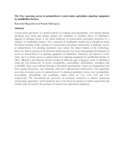Please use this identifier to cite or link to this item:
https://cris.library.msu.ac.zw//handle/11408/3769Full metadata record
| DC Field | Value | Language |
|---|---|---|
| dc.contributor.author | Mugandani, Raymond | |
| dc.contributor.author | Mafongoya, Paramu | |
| dc.date.accessioned | 2020-07-13T10:45:34Z | |
| dc.date.available | 2020-07-13T10:45:34Z | |
| dc.date.issued | 2020 | |
| dc.identifier.issn | 1387-585X | |
| dc.identifier.uri | https://doi.org/10.1007/s10668-020-00795-x | |
| dc.identifier.uri | http://hdl.handle.net/11408/3769 | |
| dc.description.abstract | Conservation agriculture is a global response to rampant land degradation, soil nutrient mining, declining crop yields and climate change and variability in southern Africa. In Zimbabwe, digging of planting basins is the main archetype of conservation agriculture practiced by a majority of smallholder farmers. Yet, a majority of smallholder farmers have complained about the labour demand of this typology of conservation agriculture, particularly at planting. Access to animal-drawn CA planting machinery may reduce the labour burden of the technology. However, there is paucity of the literature addressing the non-socio-demographic determinants of access to animal-drawn CA planting equipment in Zimbabwe. Therefore, the objective of this study was to evaluate access to animal-drawn CA planting equipment by smallholder farmers in Chivi, Murehwa and Mutoko districts located in different agro-ecological zones of Zimbabwe using the 5As framework of access: acceptability, accessibility, affordability, awareness and availability. Data were collected through a household questionnaire, which was triangulated with focus group discussions, key informant interviews and personal observations. The significant non-socio-economic access to animal-drawn CA planting machinery factors was: acceptability, accessibility, affordability and availability (mean scores of 1.32, 1.44, 1.90 and 1.36, respectively). We recommend the provision of monetary incentives to farmers practicing conservation agriculture. Such incentives have to be based on amount of carbon sequestered and should solely be used for the purchase of conservation agriculture equipment. | en_US |
| dc.language.iso | en | en_US |
| dc.publisher | Springer | en_US |
| dc.relation.ispartofseries | Environment, Development and Sustainability; | |
| dc.subject | Conservation agriculture | en_US |
| dc.subject | Acceptability | en_US |
| dc.subject | Accessibility | en_US |
| dc.subject | Afordability | en_US |
| dc.subject | Availability | en_US |
| dc.subject | Zimbabwe | en_US |
| dc.title | The 5As: assessing access to animal drawn conservation agriculture planting equipment by smallholder farmers | en_US |
| dc.type | Article | en_US |
| item.fulltext | With Fulltext | - |
| item.cerifentitytype | Publications | - |
| item.languageiso639-1 | en | - |
| item.openairetype | Article | - |
| item.grantfulltext | open | - |
| item.openairecristype | http://purl.org/coar/resource_type/c_18cf | - |
| Appears in Collections: | Research Papers | |
Files in This Item:
| File | Description | Size | Format | |
|---|---|---|---|---|
| The 5As.pdf | Abstract | 6.4 kB | Adobe PDF |  View/Open |
Page view(s)
244
checked on Jan 15, 2026
Download(s)
48
checked on Jan 15, 2026
Google ScholarTM
Check
Items in MSUIR are protected by copyright, with all rights reserved, unless otherwise indicated.



